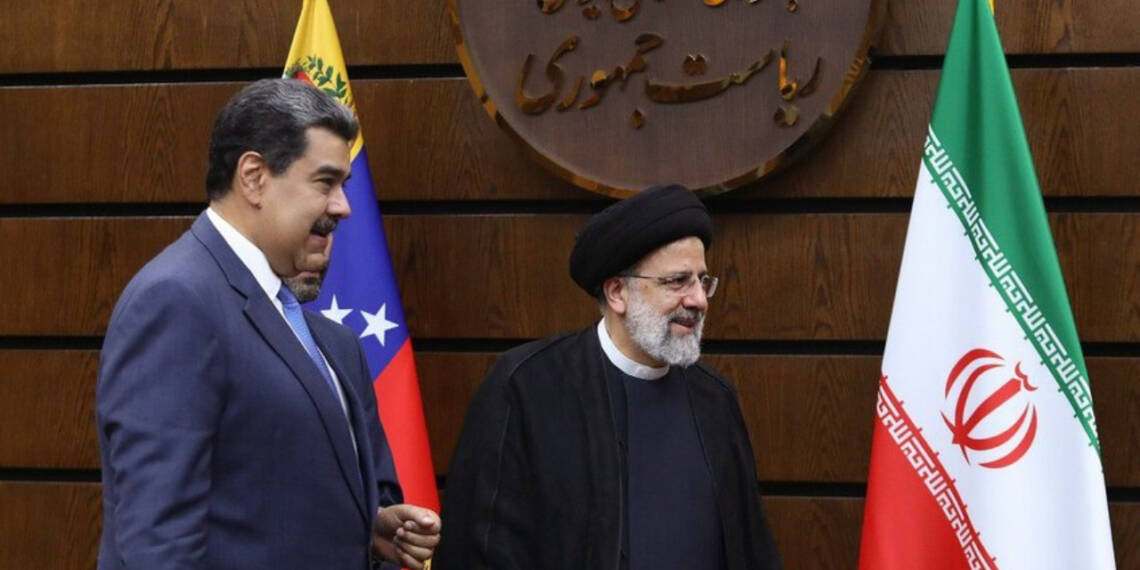Whenever we hear about Iran and Venezuela, the first thing which comes to our mind is the US and its sanctions. Both Tehran and Caracas had the same tragic journey with one of the most reprehensibly manipulative and untrustworthy countries in the world i.e. the US. Now, their destinies have brought them closer together in the unfair climate of geopolitics.
As the current developments say, both Nicolás Maduro and Ebrahim Raisi are now prioritising defeating the sinister plot of Washington.
Following the withdrawal of the US from the JCPOA deal in 2018, the US intensified its sanctions on Iran and started targeting its oil sector. Sanctions were reimposed despite Tehran’s compliance with the terms and conditions of the JCPOA deal. The Middle Eastern nation had dismantled a huge part of its nuclear program and gave outright freedom to international inspectors to ensure transparency, but the US was not ready to accept it.
Read more: Iran’s crackdown on western destabilizers

Walking on the path of the Trump administration, Biden too mistreated Iran. His incompetent administration imposed another round of sanctions in July last year. This time Washington, which is the hegemonic leader of the international order, targeted an international network of individuals and entities, alleging that they facilitated the sale of US-sanctioned Iranian petroleum and petrochemical products to East Asia.
Unfortunately, the US has a tendency to not only go after its adversaries but also against nations and individuals that it perceives as partners of its enemies.
What brought Caracas and Tehran together?
Speaking of oil and sanctions, another nation which is persistently treated unjustly by the US is Venezuela. Washington continued its illegitimate policy with Caracas.
On 2nd February 2023, President Nicolas Maduro condemned the Biden administration for issuing licenses which ban companies doing business with the sanctioned Venezuelan state-owned firms from paying cash to his government.
Last year, Biden permitted US and European companies to continue buying crude oil from Venezuela on the condition that no money be paid to Venezuela. Trinidad and Tobago which imported gas from Venezuela was barred from paying cash and threatened with sanctions if it continued importing from Venezuela.
Emphasizing the colonial tendency of Washington, Maduro condemned the US Treasury’s Office of Foreign Assets Control (OFAC) and called on sovereign nations in Latin America and the Caribbean to “denounce this colonial model”.
In these circumstances of constant rift and heightened tensions between the US and Venezuela, Iran’s foreign minister Hossein Amir Abdollahian visited Venezuela on 4th February and held a meeting with Maduro.
After the meeting, the Venezuelan president released a statement in which he emphasised the strengthening of the partnership between Iran and Venezuela in the fields of industry, science and culture.
In an apparent reference to Washington, Iran and Venezuela, who are the chief adversaries of the US also stressed defending their national interests from outside players.
Read more: Israel attacked Iran to teach a lesson to the US
Similarly, Maduro too visited Iran last year in June and signed a 20-year agreement with Tehran which focused on increased cooperation in the sectors of petroleum, petrochemical and defence. It must be noted that both Iran and Venezuela are also members of OPEC with which the US is embroiled in a dispute regarding oil production.

Therefore, Maduro has realised that any partnership with the US is equivalent to putting Veneuzela’s sovereignty, territorial integrity, economic prosperity and political stability in jeopardy. The same goes with Iran where Ebrahim Raisi has been the victim of several betrayals of Washington including the JCPOA deal and is now reverting back to the West.
This has culminated in both strategically prominent leaders in the arena of geopolitics strengthening their ties in the face of persistent nefarious political, economic and diplomatic onslaughts of the US. Iran and Venezuela, which are the principal enemies of Washington, are consolidating their relationship in order to avert the unpredictable hegemonic assaults of the superpower bully.








